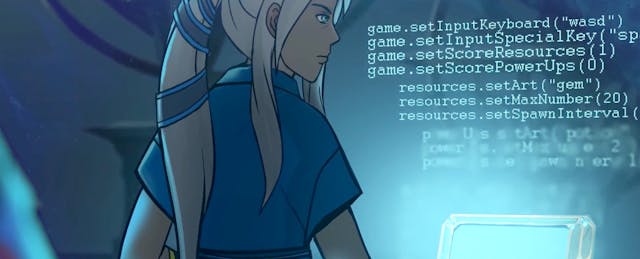The gaming industry is riddled with blockbuster fighting games. But in the classroom, their appeal is much more limited. That’s among the lessons CodeCombat has learned over the years through its swashbuckling eponymous game, which features a series of puzzles and challenges that introduce kids to Python and JavaScript.
For its next title, the San Francisco-based company is sheathing the swords and shelving the spears. Dubbed Ozaria, the new game aims to impart computer science and programming concepts via a narrative-driven fantasy adventure that encourages players to create—not crush.
To develop the new product and expand its footprint, CodeCombat has also raised $6 million in a Series A round, led by Veronica Wu from Hone Capital. Other investors include Extol Capital, OceanOne Capital and Andreessen Horowitz, which also contributed to the company’s previous fundraise. To date, the San Francisco-based startup has raised $8 million.
CodeCombat launched a prototype of its first game on Reddit in 2013, attracting eyeballs from internet denizens as well as the founders of Y Combinator, who invited them to participate in the technology startup accelerator. With the look and mechanics of mainstream adventure games and mature themes, CodeCombat marked a departure from many other coding games at the time, which often featured a more kid-friendly aesthetic.
Today, the company claims that the original game has reached 12 million players around the world—including more than 40,000 teachers across the U.S. That’s despite the fact that “we didn’t design it for the classroom,” says Nick Winter, co-founder and CEO of CodeCombat. Still, the game was endorsed by The College Board as one of a handful of recommended tools for helping students prepare for the AP Computer Science Principles exam.
CodeCombat has also found a home in nontraditional settings, such as schools in youth detention facilities. In Kentucky, the game was used at a rehabilitation center for girls as part of a computer science initiative led by the Center for Educational Excellence in Alternative Settings (CEEAS), a nonprofit that provides educational programs in juvenile centers across 44 states.
“Our goal for the initiative was to try to identify kids who are naturally good at coding, and then give them the opportunities to develop those skills,” says Kat Crawford, the director of technology solutions at CEEAS. One of the girls from the Kentucky pilot went on to major in computers and technology at a local community college.
With Ozaria, the company is dialing down the violence and growing up. “Combat doesn’t play well in today’s educational climate,” Winter adds.

Where CodeCombat played more like a series of puzzles, Ozaria promises a cohesive storyline featuring a hero (the player) who must create things with code to save the world from encroaching darkness.
Both titles cover similar subjects aligned to the standards created by educational organizations including Computer Science Teachers Association, Winter adds. The main difference is that unlike CodeCombat, Ozaria does not have a home version and is only available for use in classrooms.
Ozaria is spliced into different chapters, each consisting of several lesson modules that cover basic concepts like variables and scale to increasingly advanced functions involving arrays and loops. Each chapter concludes with a creative capstone project where students apply what they’ve learned to build their own game.
The prologue chapter for Ozaria, offering about two hours of content, is available for free today. Subsequent chapters, which will be released about once a month, will provide up to 8 hours of content, Winter estimates. (Some students may progress a lot faster, he notes.) Access to Ozaria and CodeCombat’s original game will be offered as a subscription, starting at $10 per month, with discounts for bulk and institutional purchases.
In addition to a new game, CodeCombat has also expanded its operations to China, where it now fields a team of eight employees. That effort began last November, following what Winter calls a “wildly successful” launch of its game there earlier that year. In April 2018, CodeCombat partnered with NetEase, a publicly traded Chinese internet and gaming company, to distribute its game across the country. Shortly afterward, “our monthly active users in China was higher than the rest of the world combined,” he claims.
By its sheer size, the Chinese market has long been alluring to American companies. But for other edtech entrepreneurs thinking of following in CodeCombat’s footstep, Winter offers a warning. “There’s always the risk of copycats, and there are very fast tech teams that can move quickly.” Connections are paramount, and Winter credits his investors with helping the team find a local general manager.
“If you don’t have a team on the ground you trust, you’re going to be copied, defeated and kicked out,” he adds. “That’s just the cost of playing the game.”


